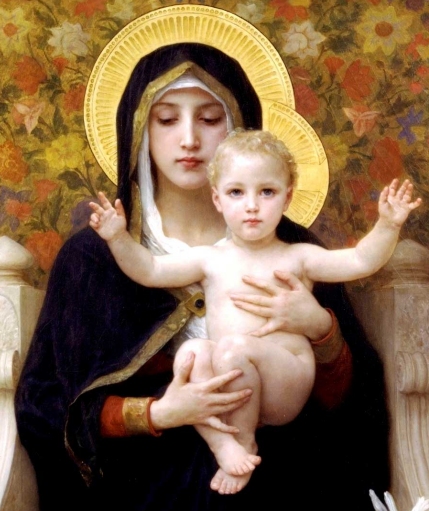
From
the Acts of Pope Pius XI
In the year 1931, amid the applause of the whole Catholic world, solemn rites were celebrated to mark the completion of the fifteen centuries which had elapsed since the Council of Ephesus, moving against the Nestorian heresy, had acclaimed the Blessed Virgin Mary, of whom Jesus was born, as Mother of God. This acclamation had been made by the Fathers of the Church under the leadership of Pope Celestine. Pius XI, as Supreme Pontiff, wished to commemorate the notable event and to give lasting proof of his devotion to Mary.
In the year 1931, amid the applause of the whole Catholic world, solemn rites were celebrated to mark the completion of the fifteen centuries which had elapsed since the Council of Ephesus, moving against the Nestorian heresy, had acclaimed the Blessed Virgin Mary, of whom Jesus was born, as Mother of God. This acclamation had been made by the Fathers of the Church under the leadership of Pope Celestine. Pius XI, as Supreme Pontiff, wished to commemorate the notable event and to give lasting proof of his devotion to Mary.
Now, there had existed for many years in Rome a grand
memorial to the proclamation of Ephesus, the triumphal arch in the basilica of
Saint Mary Major on the Esquiline Hill. This monument had already been adorned
by a previous pontiff, Sixtus III, with mosaics of marvelous workmanship, now
falling to pieces from the decay of the passing ages. Pius XI, therefore, out
of his own munificence, caused these to be restored most exquisitely and with
them the transept of the basilica. In an Encyclical Letter Pius set forth also
the true history of the Council of Ephesus, and expounded fervently and at
great length the doctrine of the prerogatives of the Blessed Virgin Mary as
Mother of God. He did this that the doctrine of this lofty mystery might sink
more deeply into the hearts of the faithful. In it he set forth Mary, the
Mother of God, blessed among women, and the most holy Family of Nazareth as the
exemplars to be followed above all others, as models of the dignity and
holiness of chaste wedlock, as patterns of the holy education to be given
youth.
Finally that no liturgical detail be lacking, he decreed
that the feast of the Divine Motherhood of the Blessed Virgin Mary be
celebrated annually on the 11th day of October by the universal Church with a
proper Mass and Office under the rite of a double of the second class.

A
Homily of St. Bernard the Abbot
Homilia 1. de Laud. Virg. Matris
Homilia 1. de Laud. Virg. Matris
“Son, why hast thou thus dealt with us?” Mary called God, the Lord of Angels,
her son. Which of the angels would have dared to do so? It is enough for them,
and they reckon it is a great thing, that, being naturally spirits, they should
receive the grace of being made and called angels, as witness David: “Who
maketh spirits his angels.”
But Mary, knowing herself to be his Mother, doth boldly
apply the word Son to that Majesty whom the angels do serve with awe; neither
doth God despise to be called what he hath made himself. For a little after,
the Evangelist saith: “And he was subject unto them.” Who to whom? God to men.
I say that God, unto whom the angels are subject, and who is obeyed by the
Principalities and Powers, was subject to Mary.
Marvel thou at both these things, and choose whether to
marvel most at the sublime condescension of the Son, or at the sublime dignity
of Mary. Either is amazing, either marvelous. That God should obey this woman
is a lowliness without parallel; that this woman should rule over God, an
exaltation without match.
In praise of virgins, and of virgins only, is it sung that “These
are they which follow the Lamb whithersoever he goeth”. Of what praise, then,
thinkest thou that she must be worthy who even leadeth the Lamb? O man, learn
to obey. O earth, learn to submit. O dust, learn to keep down. It is of thy
Maker that the Evangelist saith: “And he was subject unto them.” Blush, O proud
ashes. God humbleth himself; and dost thou exalt thyself? God is subject unto
men; and wilt thou, by striving to rule over men, set thyself before thy Maker?
O happy Mary, lowly and virgin; and wondrous virginity,
which motherhood destroyed not, but exalted; and wondrous lowliness, which the
fruitful virginity took not away, but ennobled; and wondrous motherhood, which
was both virgin and lowly. Which of them is not wondrous? which of them is not
unexampled? and which of them doth not stand alone? The wonder would be if thou
wert not puzzled at which to wonder most: motherhood in a virgin, or virginity
in a mother; a motherhood so exalted, or lowliness in such exaltation.
But indeed more marvelous than any one of these things is
the combination of them all, and without all comparison, it is more excellent
and more blessed to have received them all, than to have received any one of
them alone. What wonder is it that God, of whom we see and read, that He is
wonderful in his holy places, should have shown himself wonderful in his Mother?
O ye that be married, honor this incorruption in corruptible flesh; O holy
maidens, gaze in wonder at motherhood in a maid; O, all mankind, take pattern
by the lowliness of the Mother of God.
No comments:
Post a Comment